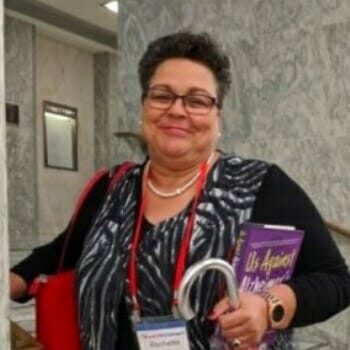Rochelle Long

At first, it was difficult to talk about my mother and my aunt’s mental deterioration in detail, but ultimately, participating in my first clinical trial as a study partner was empowering. It gave me a purpose—an opportunity to use my knowledge of my family’s experiences to help future generations.
February 14th, 2020
Caring for a loved one suffering from Alzheimer’s is a difficult challenge. I have cared for my aunt and my mother while they battled the disease, knowing there was no treatment to slow their decline—yet. While I cared for my family, I dedicated my time to seeking a cure for Alzheimer’s by participating in clinical trials and recruiting study volunteers from the African American community.
Alzheimer’s clinical trials require participants to have study partners because people with the disease may need help to accurately recount their symptoms and actions. At first, it was difficult to talk about my mother and my aunt’s mental deterioration in detail, but ultimately, participating in my first clinical trial as a study partner was empowering. It gave me a purpose—an opportunity to use my knowledge of my family’s experiences to help future generations.
This opportunity, to help find a treatment and a cure for Alzheimer’s, has been the focus of my life for 15 years. I have participated in 7 clinical trials—mostly as a study subject—and I joined the University Hospitals Minority Outreach Board. Through this work and my own experiences, I have learned about the challenges that clinical trials face and how Alzheimer’s impacts different communities.
While Alzheimer’s can feel very isolating, it is in fact a widespread public health crisis. Today, 6 million Americans have Alzheimer’s, and without progress towards a cure, 14 million Americans will have the disease in 2050. The national cost of caring for people with Alzheimer’s was $290 billion dollars in 2019, and the projected cost for 2050 is $11 trillion.
There is another unjust cost to Alzheimer’s as well. Women are more likely to care for relatives diagnosed with Alzheimer’s, and African American women are twice as likely to be diagnosed with Alzheimer’s as white Americans. People like my aunt, my mother, and myself are more likely to spend money on Alzheimer’s care, to care for someone with Alzheimer’s and to be diagnosed with the disease. 20 percent of Alzheimer’s patients are African Americans, and we pay one-third of the national cost.
Despite this disparate impact, African Americans’ participation in Alzheimer’s clinical trials is very low, and as a result, too many clinical trials have volunteers that do not reflect the population. Researchers fear that this lack of diversity will impede the development of drugs that work for every person with Alzheimer’s. On top of this problem, 90 percent of Alzheimer’s trials are delayed by insufficient recruitment.
That is why I began participating in clinical trials as soon as I qualified. With my participation, I honor my aunt and my mother, and I fight for my children and my grandchildren. Even though there is not a cure, you can still help your loved ones who are suffering from Alzheimer’s by joining a clinical trial. Volunteering gave me a sense of purpose, and it is the most important thing you can do to fight back for your family, your community, and future generations.
Last year, I was honored with the Global Alzheimer’s Platform Foundation’s® first-ever National Citizen Scientist® Cornerstone Award for my participation in clinical trials and recruitment efforts. At the ceremony, I met fellow nominees who have cared for relatives with Alzheimer’s and who have, like myself, devoted their lives to clinical trial research and finding treatments for the disease. The last 15 years of work in the Alzheimer’s community has been some of the most fulfilling work of my life. Alzheimer’s can make you feel small, but the community of people searching for a cure is big and ever-expanding.
We can find a cure to Alzheimer’s, and clinical trials are the only way to find that cure. If you are 50 or older and you share my commitment to finding a cure, find the Alzheimer’s research center near you and join the community of volunteers making an impact.
Rochelle Long cared for her aunt and her mother while they battled Alzheimer’s. She has participated in seven clinical trials at the University Hospitals Cleveland Medical Center and serves on the University Hospitals Minority Outreach Board. In 2019, the Global Alzheimer’s Platform Foundation® presented Rochelle the first-ever National Citizen Scientist® Cornerstone Award.